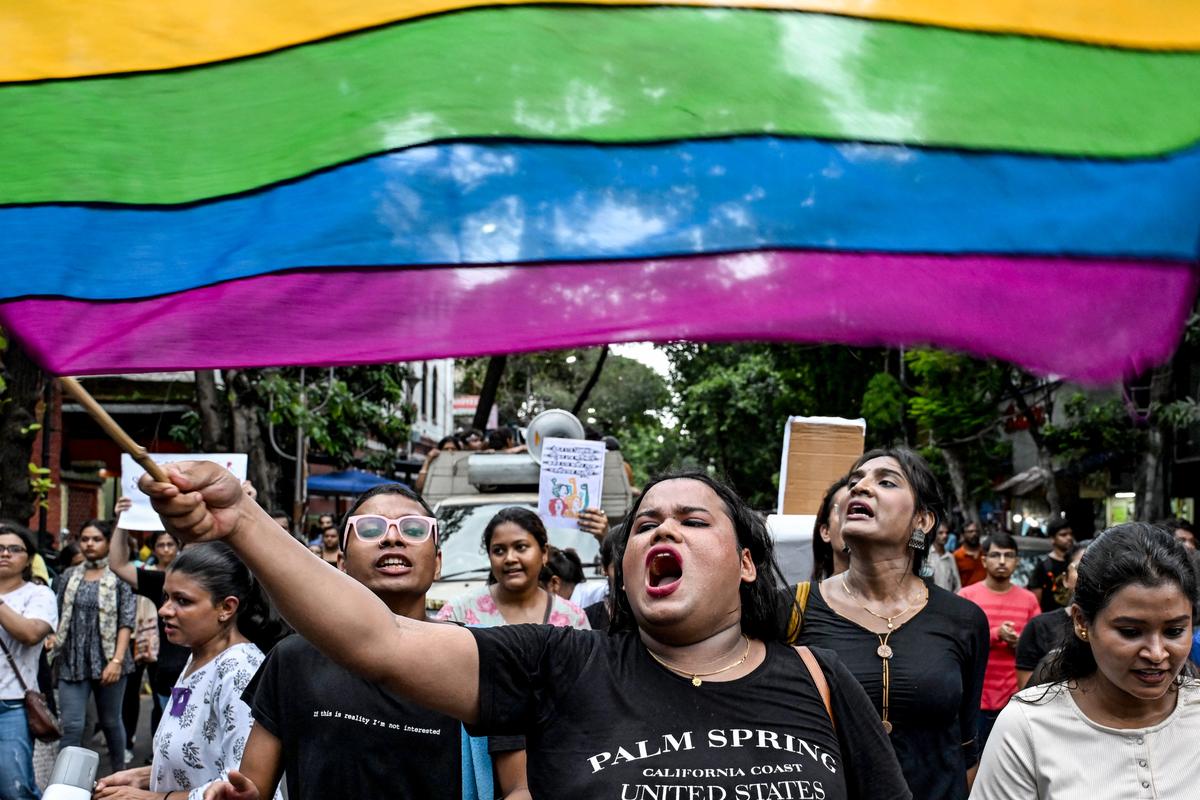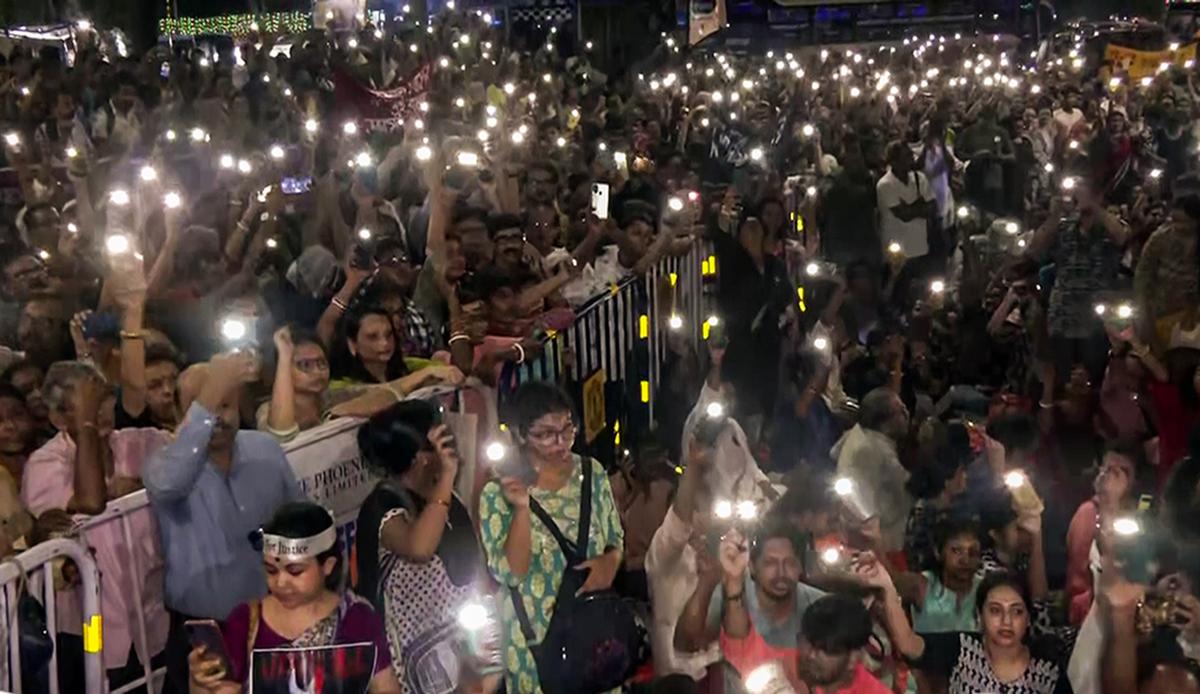The nights have been made cautious for women, as the clock is moving towards night, women are being made to feel unsafe in their own city, their own neighbourhood, their own workplace. Society wants women to come back under patriarchal surveillance by nightfall. After the rape and murder of Trainee Doctor at RG Kar Hospital, Kolkata on August 9, 2024These patriarchal values enabled this Sandeep Ghosh, former principal of RG Kar Hospital. Commenting that it was irresponsible for the girl to be alone at night. The comment served as a catalyst for thousands of women to take to the streets demanding answers as to why nights have been systematically made unsafe for them.
Why “Reclaiming the Night”?
Despite the huge reaction after the rape case, West Bengal government decided to limit women’s working hours at nightA move that enraged women from all social classes and backgrounds. Instruction Supreme Court had criticizedThe National Crime Records Bureau (NCRB)’s annual report for 2022, the latest available, shows that 4.45 lakh cases of crimes against women were registered, which is equivalent to about 51 FIRs every hour.

The protest call of “Reclaim the night, reclaim the rights” was first raised by a group of gender activists at three locations in Kolkata on the midnight of 15 August. Soon in many other districts like Howrah, Hooghly, Jhargram, women from different regions and age groups made it their own and what happened from August to October became the biggest ever mobilization and sustained protests against gender violence in Bengal. Was one of.

A school teacher from West Bengal’s Hooghly district, who was part of the protests, said that when she first got the news of the rape and murder of the RG Kar doctor, she thought it would be treated as another rape incident. And people will move forward. But. He said he thought the protests would be held in Kolkata, but when the call was made at the local level, he decided to participate. “That night when we were out we noticed that it was different from other nights,” he said.

He claimed that the protests have had a deep impact on the society and will explode again soon if the government tries to suppress people in any way.
‘If a man is free to spend the night outside his home, why not a woman?’
Mamoni Panja, a university student from Ultadanga, Kolkata, explained how the “Reclaim the Night” protest was able to raise some fundamental questions about workplace safety and women’s rights. He said if a man is free to spend a night out then why not a woman? He said, “Sandeep Ghosh’s comment on the doctor being alone in the seminar room at night after duty has hurt the dignity of all of us.
Shatabdi Das, one of the organizers of the “Reclaim the Night, Reclaim the Rights” movement, believes that the protest worked as an awakening for women. Women, who often engage in victim blaming, rejected the generalization of the fact that going out at night could make a woman vulnerable to sexual violence.
“We have seen many new women leaders who have organized protests in many districts, people who do not have experience in arranging marches have taken many initiatives,” she said. He said that people from the trans and queer community are part of this protest and their demands for gender justice and safe spaces have also been included in the demands set out after consultation with them.
The “Reclaim the Night, Reclaim the Rights” joint platform that is organizing and coordinating with other protesters has been named as the Joint Platform of Women, Lesbian and Trans People of Bengal.

Activists and supporters of the LGBTQ community wave pride flags and raise slogans during a protest march to condemn the rape and murder of a doctor in Kolkata on September 1, 2024. Photo courtesy: AFP
demands arose from the movement
Apart from demanding justice for the RG Kar rape victim, the “Reclaim the Night” movement demanded some fundamental changes in the context of seeking justice in cases of sexual violence. One of the demands raised by the women was that victim blaming should be included in the legal framework as a punishable offence. They demanded late night public transport, safe toilets and specific washrooms for women and other gender marginalized communities and an active internal complaints committee at workplaces.
Activists have said that most of the one stop crisis centers set up by “Sakhi”, a central government scheme to provide relief and support to women facing sexual violence in West Bengal, are non-operational. They also demanded accountability from the government. How the Nirbhaya fund is being used. He was also very vocal about poor health infrastructure and allegations Irregularities in health sector,
“Wherever I go, I dress however I want. no means no…”
The protests in Bengal may have been triggered by the rape and murder of a RG Kar doctor, but the women’s anger and outrage were also a reaction against daily sexism, patriarchal violence and restrictions that permeate through all institutions. “Reclaim the Night” protestWomen also mobilized against violation of consent. In a viral video clip, a female student of Dhaka University was raising slogans about the basics of respecting women’s consent: “Wherever I go, no matter how I dress, it doesn’t mean no, yes means yes…” Women in Kolkata soon adopted it and the slogan became popular.
Taking oath to destroy rape culture
As organizers of the “Reclaim the Night” protest, ordinary women were able to sustain the protest through early discussions among themselves about their experiences of facing violence or being in an unsafe workplace. In contrast, the way the West Bengal government tried to pacify the protesters Passing Anti-Rape Bill, Aparajita BillTaking a top-down approach, the protesters tried to create a space where women could come together in public spaces and demand change through participation. He called a meeting on October 3, 2024 at Shyambazar, Kolkata from 9 pm. An organizer said that many women activists and others from the slums have attended and shared their experiences at the meeting called “”.rater meeting“(A meeting held at night). She said it was an open forum where women shared their concerns about their daughters’ safety or experiences of domestic and sexual abuse and how they were angry about facing sexism in public places.
These protests also saw a celebration of the indomitable spirit of the revolutionary women of undivided Bengal. Pritilata Vadedar, from Kalpana Dutta, Ila Mita Feminist writer and teacher Begum Rokeya – Protestors have tried to remember her in slogans and creative posters, flags and how women left an indelible mark in political and social struggle since pre-independence days and also waged a war against patriarchy . The protesters had called on the society to observe the martyrdom day of Pritilata Vadedar on September 24, 2024, to take an oath to end rape culture.
Pritilata Vadedar, a 21-year-old revolutionary woman from undivided Bengal, was part of the famous Chittagong Armory Raid against the British in 1930 and died by consuming cyanide to avoid arrest by the British police.
Organizers of the “Reclaim the Night, Reclaim the Rights Movement” had listed some pledges and circulated the document in social media for others to use, such as not shaming any survivor of rape, Not engaging in victim blaming, taking an oath to fight for the rights of all. Public and private spaces stand in solidarity with marginalized people of gender and sexuality. He also mentioned forming a resistance team to unite to fight for safety and respect.
Patriarchy and dangerous culture
Mamoni and her sister, who took part in the Reclaim the Night protest, claimed that they were threatened by local Trinamool Congress members in Kolkata’s Ultadanga. Mamoni shared how she then led a march with other women in her area. She said that her parents supported her during this time and never stopped her from participating in the protests. Talking about the “culture of threat”, he mentioned how people living in slums are kept in danger by people belonging to the ruling Trinamool Congress government. Talking about the Reclaim the Night protests in villages, Das said, though the protests took place in villages on August 14, at many places women were threatened by ruling party goons.

People came in support of the junior doctors sitting on hunger strike demanding justice in the RG Kar rape-murder case in Kolkata. , Photo Credit: ANI
He also said that on January 16, “Reclaim the Night” protesters are going to plan to march to the State Secretariat and present a delegation to demand justice for RG Kar. RG Kar on the former principal of the hospital Sandeep Ghosh gets bail in RG Kar rape and murder case.He said that although he is feeling disappointed, there is a need to strengthen his fight in the coming days.
published – January 01, 2025 03:38 PM IST




